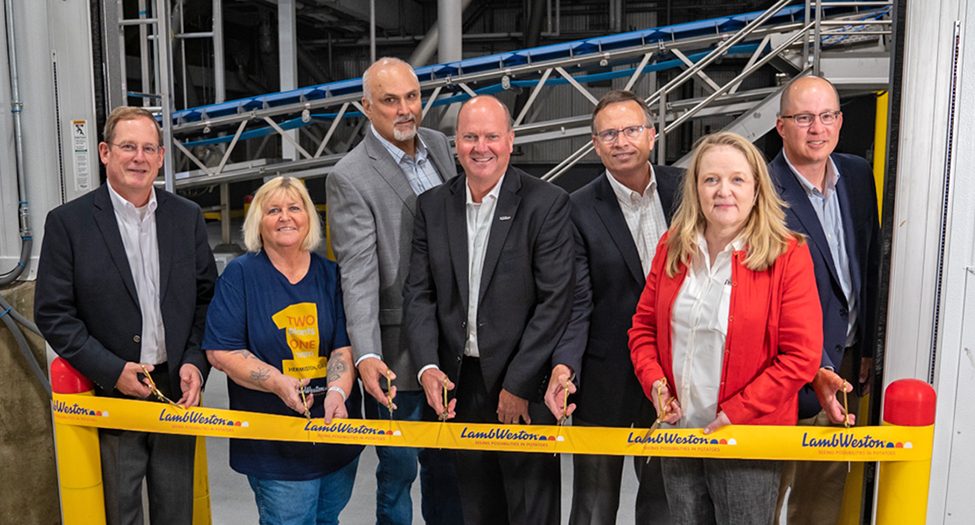
Home » French fries fuel $250M expansion
French fries fuel $250M expansion

July 15, 2019
As the famous brassy trumpets from the “Rocky” movie pumped out of the speakers, Lamb Weston officials cut a ribbon to celebrate the opening of their new Hermiston plant.
Like boxer Rocky Balboa, they’ve been training and focusing on their prize: a $250 million 300,000-square-foot expansion.
The addition of the new french fry processing line to Lamb Weston’s existing facility at 78328 Cottonwood Bend is expected to add 150 more jobs.
It’ll also increase plant capacity by about 300 million pounds annually, enabling more than 500 employees to make nearly 750 million pounds of frozen french fries annually.
Products made in Hermiston are served in restaurants in the U.S. and globally.
The Hermiston plant is a “critically important piece” of the company’s plan going forward, said Lamb Weston President and CEO Tom Werner during the June 13 event.
“It’s an exciting time to be with Lamb Weston. We have invested in our business over the past several years to support, most importantly, our customers and their growth plans. As I’ve said before, we’ll continue to do that going forward, so Hermiston … is critically important not only to our domestic customers but also some of this facility will be pointed internationally and we have some very big customers we support out of this facility,” he said.
Werner said before the ceremony he “got asked 10 times in this room” when the next plant would open.
He said he didn’t know.
“We are going to continue to invest in this company and in our communities like we have in the past going forward because we have tremendous opportunities ahead of us,” he said.
Lamb Weston’s overall net sales increased 7 percent to $927 million in the third quarter 2019.
JH Kelly of Longview, Washington, was the general contractor for the Hermiston project.
To encourage the potato processor to expand in Hermiston, the city of Hermiston and Umatilla County agreed to offer a hefty property tax break. The plant is outside of Hermiston city limits but within the city’s enterprise zone, an area eligible for property tax exemptions.
In lieu of annual property taxes, Lamb Weston will split $1 million between the city and county annually for 15 years. Without this agreement, Lamb Weston would be liable for an estimated $35 million in total property taxes, said Mark Morgan, Hermiston’s assistant city manager.
“The resulting savings of $20 million equals nearly 9 percent of the company’s total investment” and “given the globally competitive market which Lamb Weston operates within, it is safe to assume that this investment will not occur without approval of this agreement,” Morgan said.
In exchange for the incentives, Lamb Weston agreed to invest $225 million in the plant, hire at least 140 full-time employees and pay average annual wages equal to about $38,000, or about $18 an hour.
Leslie Winker is one of the longest-tenured employees at the plant, working there for nearly 50 years — since she was 16 years old.
Before the plant opened in 1972, she worked weekends doing cleanup.
“I started out as a general laborer,” she said, before listing a variety of jobs she’s done over the years, from working palletizers and forklifts, to being a package operator. Today, she works in the continuous skills and development department.
“We train all the new hires to make sure they know how to do the job properly before they go down to the floor,” she said.
Working at the Hermiston plant has been a family affair.
The Hermiston High grad’s mom worked at the plant for 12 years and she met her husband Bruce there, too. He worked there for 38 years. Today, their son works at the plant.
“My family alone has worked for Lamb Weston for about 110 years. I’m proud to say Lamb Weston is a great company to work for,” she said.
The Hermiston project comes on the heels of a $200 million processing line addition in Richland in 2017, an expansion that also added about 150 jobs.
Carol Samoray, vertical start-up manager for the Hermiston project, said she appreciated the assistance she received from her colleagues who had already been through a plant expansion.
“No matter the obstacle that we had, there were people all around us in the Lamb Weston community to support us during our journey, from IT to production planning, to the food protection group and R&D and supply chain overall. No matter what we had to do, many people raised their hand and said, ‘I can help you with that,’” she said.
Real Estate & Construction Local News
KEYWORDS july 2019
Related Products




